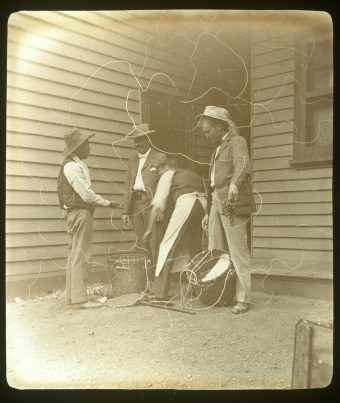 This is a very particular time in the Australian calendar.
This is a very particular time in the Australian calendar.
Here, Christmas holidays and summer combine to create an extended feeling of languor and disorientation; the flurry of December’s capitalism cedes to subdued streets and a succession of sporting fixtures. In many of our coastal capitals, people flee to the beaches. Around about now, however, as children return to school and traffic mounts, it is clear the year has begun in earnest.
And so it is for Peril.
After a break in December and January, our team has been working on what 2019 looks like for Peril – our strategies and publication plans – all of which are filling us with excitement, and a certain amount of nerves.
We have three exciting editions planned for this year, and we can’t wait for you to be a part of creating them.
In the early part of 2019, for Edition 35: Man Up, we will asking questions about masculinity, particularly how and to what end racialised identities are gendered and sexualised? If Hollywood is changing views of Asian men, how is that change expressed, and how do these new/”re-viewed” men play their role in the rapidly evolving dynamics of gender in our cultures?

Then, as the winter months cool, we will be asking you to look back.
In Edition 36: History Repeats, we will be considering, as many have considered before us (okay, namely, Shakespeare), the past as prologue. We want you to look back at Australia’s history and explore our Asian migrants, workers, travellers, visitors and intruders and tell us what might have been? Make history your map or your fortune cookie, we can’t wait to see what you do when you subvert the narrative gaze and animate the archive.
Finally for 2019, in Edition 37: Testing Times, we’re asking what exactly it means to be ‘Australian’ – what it takes to pass, what it takes to fail. We will be bringing this edition to you right around the time of Australian Citizenship Day, so whether or not you think you’d ace it or burn it, we want to know what you think about the ways in which we become or do not become Australian.
We’ll be dropping dates and callout info in the coming weeks – so polish those pitches, poems, short stories, essays, memoirs, or wherever your work sits in between. Subscribe to our newsletter so that you never miss a deadline!
We’re also excited about upcoming partnerships with the Queensland Poetry Festival and Diversity Arts Australia’s Stories from the Future project. We will be working with a few more new and familiar faces, so keep your eyes peeled for what next. We were so thrilled with the feedback from our ‘Ritual /Resistance’ exhibition party in Sydney, thanks to our brilliant Music Editor, Tanya Ali, and Visual Arts Editor, Tanushri Saha, that our planning gears are already turning for part deux. Look out for your invitation around July.
We’ll also committed to strengthening our connections to writers and artists outside of the major metropolitan areas. We’re coming up on our thirteenth birthday, and our priorities remain the same as they were from the beginning: to connect with new voices across the continent who are defining what “Asian Australia” looks like, sounds like, feels like. In 2019 we want indeed— with you— to swamp the nation entire with critical passion, radical candour and outstanding stories from dangerous Asians across this land.
For the first time ever, we’re also going to be asking for your financial support. We pride ourselves on remunerating our contributors and editorial team as fairly as possible, and thanks to past grant funding we have been able to do so. You may have noticed we’ve set up a new ‘Support’ page. Big, small or otherwise, we know we can count on you, our readers, our contributors and our dedicated supporters, to keep Asian Australian writing and arts on the radar. You’ll be hearing from us, so we can keep hearing from you.
Summer is over. Shit is getting real.
For we have just seen the 26th of January go by.
We have talked about the complexities of this day before and the role of migrants within that:
[T]he coloniser’s position has so often been legitimised by the migrant – the group ideally positioned to demonstrate the coloniser’s sovereignty, the ability to control the borders and boundaries, to define legitimacy and illegitimacy, to marshal force and to commit violence.
The calls to change the date might seem new, but the resistance that they reflect has been long sustained. Focused Indigenous opposition to Australia Day has been a recurrent — and well publicised — theme for at least 30 years, since our awkward commemoration of the bicentenary. Even as early as 1938, the year of the sesquicentenary of settlement, the Aborigines Progressive Association declared it a Day of Mourning and Protest.
As our Aboriginal and Torres Strait Islander communities (continue to) call for us to change the date – it is incumbent on all Australians to ask ourselves some hard questions. Why does this call trouble ‘us’ so? How can we expand the conceptual parameters of belonging to and becoming Australian without descending into neo-nationalism? If we continue to trap our debates around culture in Australia in the process of assimilation, what will we lose? And who in their right mind wants a replica Endeavour? Surely we want to be proud of our human rights record, not our proverbial white elephants?
It’s the International Year of Indigenous Languages – what will that mean for Australia? Some cute new signage? Or a whole new vision or how we might (still) call Australia home? Culture wars may be boring for some, but here at Peril they are front and centre. Politics and culture are intrinsically linked. Indeed, in an evermore complex world, culture may be what most of us understand to be politics.
As Asian Australians, we cannot be sentimental about past myths, while remaining indifferent to the contemporary impacts of colonialism. This indifference is the roadblock to moving the culture forward. 2019 is time for some deep listening, friends.
The timing couldn’t be more poignant for a publication focused on the stories of race, place and belonging in Australia. These are the stories in which we describe and inscribe what it means – to be a “man” – to be a part of history – to belong to this country – these are stories of this time and this place. Visions of what has been and what is yet to come. These stories matter. We can’t wait to hear yours.
